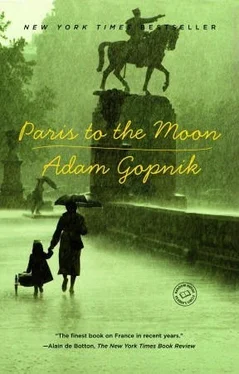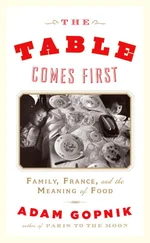There was Serge Klarsfeld, whose son Arno was one of the leading civil prosecutors in the trial. (In a French courtroom, four or five separate prosecution teams—some civil, some from the government—can all argue the same case, each in its own way.) Arno drove the other prosecutors crazy. At the last minute he pleaded for a lesser penalty for Papon than perpetuite, the life sentence, demanded by the parquet, the prosecuting government authorities. And during the trial he led a move to have the presiding judge barred, on the ground that a relative of his had been among the deportees. (This may have been a preemptive strike, to keep the defense from raising the same point.) Then, after the motion failed, he took it on himself to disassociate Papon from other, worse war criminals, like Paul Touvier and Klaus Barbie, whom his parents had also helped bring to justice, announcing that, unlike them, Papon had merely signed papers. Since the whole point of the trial was to establish that signing papers was itself a crime, the other prosecutors understandably developed an even more intense dislike of Arno. Arno became the event of the trial. Out of the black robe and white kerchief that French lawyers still wear, making them look like perpetual Daumier drawings, he could often be seen in jeans, with his shirt hanging out. He is handsome, but in a modelish way, with too much hair and too open a collar. For a while before the start of the trial, he lived with the model Carla Bruni and had been photographed in Paris Match with her on a romantic vacation in Venice. Most days he arrived at the Palais on Rollerblades. Even in America this would have been controversial. In France it was regarded as just short of mooning the judges.
Above all, there was Papon himself, pompous and aging and erect and unrepentant. For the first time in a French war crimes trial, there was a figure of sufficient Mephistophelian stature to excite a moralist. Papon may have been evil, but he was certainly not banal. According to the rules of French trials, he was allowed not just to speak but to pontificate, and from the courtroom came daily dispatches recording, in the sonorous, Gaullist tones of the high estate, his views on the trial and the witnesses brought against him. “This testimony is moving in both its nature and the dignity with which it was given,” he said of one witness. Or again, “I cannot help but express my emotion in the face of this sober, painful account. It brings back heart-wrenching memories.”
The trial failed to clarify its subject, for reasons that were partly complicated and French, partly universal and human. The universal and human reason was that Papon was an old man being tried as an accomplice to murder. Complicity is hard to prove in any courtroom, and old men make bad culprits. Papon was sick—too sick, the doctors said, to be held in prison during the trial—and his wife was even sicker; after he went home for her funeral, there were those who thought that he might not come back. Whenever it seemed that the accusers had assured the necessity of his conviction, Papon stumbled, or fell sick, or a confused memory intervened, and one was reminded that here was a very old and decrepit functionary. Whenever one wanted to leave the verdict to the historians, one was reminded by some piece of heartbreaking evidence—a few words about a wife, a mother—that here in person was the instrument by which the French state casually delivered children to their murderers. We will have justice, said the ghosts. I will soon be one of you, said the guilty man. The trial went on for six months—too short a time to try Vichy, someone said, and too long a time to try Papon.
There is an idea, beloved of American editorialists, that the Vichy regime itself was on trial in Bordeaux and that France was finally “confronting its repressed past.” This is a myth. The French have been obsessed with the details of Vichy for at least twenty-five years. Almost every bookstore keeps a shelf of books devoted to these four years of France’s thousand-year history. Frenchmen of the left and of the right long ago accepted that Vichy was made possible by the German army but followed homegrown right-wing ideology, and was broadly popular.
What was on trial in Bordeaux was not Vichy but something more: I’etat, the state itself, through the acts of one of its most successful representatives. The French war crimes trials of recent years, from Barbie the Gestapo man to Touvier the militiaman to Papon the fonctionnaire, have been moving closer to the heart of the French identity. The idea of l’etat, the state, and its representatives, the hauts fonctionnaires, has a significance in France that is incomprehensible to Americans, for whom it means, at best, the post office. L’Etat suggests far more than the mere sum of the civil service. It has the authority that the Constitution has in America, that the monarchy until recently had in Britain. (Serge July, of the newspaper Liberation, has even referred to “the religion of the fonction publique.”) The state is the one guarantor of permanence in a country where neither the left nor the right can quite accept the legitimacy of the other side.
In France the state intervenes between the nation, the repository of racial memory, beloved of the right, and the republic, repository of universal rights, beloved of the left. Its presence lets them coexist: The state keeps the nation from becoming too national, and the republic from becoming too republican. In France the state suggests the official, disinterested tradition of service; it means the functioning and unity of the country; it means what works. When one of the lawyers at the trial, trying to give an interview in English, was prompted with the term civil servant as a translation for what Papon had been, he repeated it and then visibly gagged, as though he’d swallowed a bad oyster;
the idea of associating the word servant with the social role he was describing was just too weird.
The cult of the state makes France run. Yet every cult comes at a price. The price of constitution worship, as in America, is to make every personal question a legal question—so that every pat on every bottom, every swig on a bottle, and every pull on every cigarette seem likely to have, eventually, a law and a prosecutor of their own. The price of state worship, as in France, is that real things and events get displaced into a parallel paper universe;
the state is possible only because everything has been neatly removed from life and put in a filing cabinet.
The abstraction extends into every corner of French life. The girl at the France Telecom store who is asked for a new fax ribbon finds it, places it on the counter beside her—and then spends fifteen minutes searching through her computer files, her inventory, for some evidence that such ribbons do in fact exist. The ribbon on the counter is an empirical accident; what counts is what is in the system. The reality is the list; the reality is the document. This French habit of abstraction, unlike, say, the German habit of blind obedience, is difficult to criticize, because it is linked to so many admirable things. It is linked to the French sift for generalization, for intelligent living, for the grand manner, the classical style. It not only makes the trains run on time but makes them run on time to places one would like to visit. But it was this national habit of abstraction, with its blindness to particulars, that was, in a way on trial.
The irony was that a French courtroom attended by the French political classes was the last place to defeat, or even to test, the compulsive habit of abstraction. The language of French lawyering, like the language of the institute and the academy, is an etatiste language. Inside and outside a French court-room, abstractions pile on abstractions, and by the end you are so distracted that you are unable to face plain facts: children in a cattle car being delivered to a death camp. It was not just that you could not see the trees for the forest. It was that you could not see the forest because it was covered by a map.
Читать дальше












